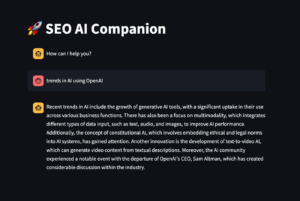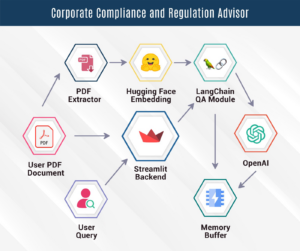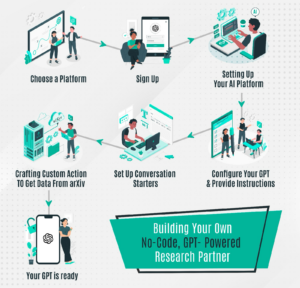The field of ai business models is always changing. Organizations want to use artificial intelligence, but they often meet challenges that block progress. In this post, we will look into common errors to avoid when making ai business models. It helps to build the right base for your work. From vague goals to not considering ethics, these mistakes can ruin good plans. Readers will learn key ideas like change management, data quality, and having workers trained properly. By knowing these issues, you can help your business use ai solutions while getting the most from it. We will look further into the major pitfalls that may block your journey to ai-driven success. Understanding this can help you form a better strategy.
Mistakes to Avoid When Setting AI Objectives
When building AI business models, the first step is defining clear AI objectives. If an organization lacks a defined objective, it can struggle with AI implementation. This often waste resources and lead to poor results. Specifying what success looks like provides clear direction.
A common mistake is to pursue vague goals. Such goals can cause misalignment. For example, a broad goal like “improving efficiency” lacks specific steps to achieve efficiency through AI. Instead, goals should be clear and measurable. A goal like “reduce costs by 20% through AI automation in two years” offers precise direction.
Next, it’s important to align AI objectives with the overall business strategy. AI projects should not develop in isolation. Many organizations overlook how these projects fit into their broader business model. Research shows that 70% of companies see poor results when their AI initiatives lack alignment with main business strategies. Aligning AI objectives with business goals allows companies to use AI more effectively.
To sum, organizations need to set clear AI objectives, avoid vague statements, and ensure they align with the business strategy. Concentrating on these areas can enhance the chance of successful AI implementation and foster sustainable growth for the long term.
Now moving onto the next point in AI business models, organizations must focus on change management as they bring in these technologies. Ignoring change management can create pushback from staff and reduce the success of AI initiatives.
Neglecting Change Management in AI Implementation
Organizations design AI business models often forget change management. Implementing AI technology cause shifts in operations, roles, and processes. Without a strategy for managing change, resistance can happen. This resistance hinders AI initiatives success.
Managing change helps in adopting AI within business smoothly. Insights show effective change management can cut project costs by 15% or more and boost success rates. It’s not just beneficial; a defined framework for change is a must.
Engaging stakeholders is key to reducing resistance during AI implementation. Involved stakeholders have collaborative culture and their input matters. Their engagement means support for the change, builds ownership over AI initiatives.
Communication is critical in managing change for AI. Organizations should use workshops and regular updates to educate teams on AI’s benefits. Showing how AI lightens workloads and enhances productivity eases fears of job losses. Good communication can outline AI advantages, building a supportive transition.
Poor change management impacts AI business models badly. Research shows 70% of change initiatives don’t succeed, mainly due to resistance from employees or low engagement. Ignoring change means expected benefits of AI technology might not happen, cycling into disruption.
Next we must consider ethical and regulatory challenges facing AI. Tackling change management builds a strong base for successful AI strategy, placing human needs equal to technology expectations.
Overlooking Ethical and Regulatory Considerations
When building ai business models, overlooking ethical and regulatory considerations represents a critical mistake. As the field of AI grows, adding ethical guidelines to AI projects is crucial for establishing trust with users and stakeholders. Companies must tackle AI ethics by focusing on bias, transparency, and accountability in algorithms. Ignoring these principles may ruin an organization’s reputation and erode trust in their ai solutions.
Also, compliance with data protection laws and rules is key to ethical ai practices. Businesses ought to learn about regulations like the General Data Protection Regulation (GDPR) and other local privacy laws concerning data collection, processing, and storage. In a survey from 2021, 86% of respondents stated they felt hesitant to use a product if they had doubts about a company’s data handling. Neglecting to setup a strong governance framework for ai could lead to severe legal penalties, financial losses, and harm to brand reputation.
Reputational risks increase greatly when ethical oversights happen. Cases in the news, such as the criticism certain tech companies experienced due to biased facial recognition tech, illustrate how ethical mistakes create distrust and regulatory issues. Organizations that fail to confront these ethical dangers may end up in public relations troubles, costing them money and weakening their market position.
In summary, the ethical considerations and legal frameworks affecting ai should be top concerns for businesses drafting ai business models. By prioritizing ethical governance and adhering to privacy laws, companies can lower risks, improve credibility, and build consumer trust as they advance to the next step; ensuring solid data quality and management practices.
Failing to Ensure Data Quality and Management
Success in ai business models depends a lot on the data quality that algorithms use. Good data leads to better insights, predictions, and decisions from ai systems. If organizations ignore data quality, they risk inaccurate outputs. This undermines their ai initiatives. About 50% of companies face data governance issues in their ai strategies, so they see unreliable results and business problems.
Poor data management can show its self in many ways. Data silos, inconsistent standards, and bad cleaning protocols create issues. These problems impact data usage. Managing data well goes beyond tech; it is vital for how ai systems perform and their trustworthiness. Companies that neglect strong data management can end up in a loop of wrong decisions based on bad insights.
To keep data organized and reliable, businesses need solid strategies for data. This includes clear governance, set formats, and regular checks for data quality. Using automated tools for validation cuts down on human mistakes and raises accuracy. Training staff on good management practices helps build a sense of data accountability in the entire organization.
As we move from discussing data quality, we must note the human aspect of ai. Overlooking the need for skilled ai talent and proper training can limit what ai business models achieve. This neglect leads to challenges in implementing and achieving favorable outcomes.
Underestimating the Need for AI Talent and Training
One mistake that organizations make when creating ai business models is underestimating how important skilled workers and training are. The ai landscape changes fast, and many organizations face a skills gap. This gap may block their efforts to use effective ai solutions.
Identifying the skills required for successful ai implementation is vital. These skills include data analysis, machine learning, and ethical issues in using ai. Without team members trained in these skills, firms struggle to gain insights from ai technologies.
For acquiring and developing talent, organizations should look at various strategies. They might invest in partnerships with educational organizations, take part in job fairs, or promote internships that give potential talent hands-on experience. Also, fostering a culture of ongoing education boosts the team’s ability to adapt to changing ai technologies.
Training and education for current employees should not be overlooked. With many executives saying their organizations lack important ai skills, it becomes essential to focus on upskilling existing staff and hiring new talent. Implementing ongoing training programs helps employees keep up with the latest trends in the field of ai.
As companies move ahead, they need to realize that ignoring ai talent and training can slow down their ability to manage data effectively. Moreover, investing in a skilled workforce is key for planning growth in ai projects, enabling organizations to expand and adapt as their needs change.
Not Planning for Scalability in AI Projects
Many organizations overlook essential factors when creating AI business models. One major factor is scalability. AI projects need planning for growth right from the start. As these projects develop, the original systems can become insufficient for rising data amounts or user numbers.
When scalability is ignored, businesses often encounter trouble. Companies begin AI projects driven by current needs. Yet, they soon face blockages as more users join or more data comes in. These situations lead to high costs in retrofitting systems. Systems design should include flexibility, otherwise, performance can drop. This frustrates users and decreases the overall value of the AI solution.
Some companies have shown how scalable AI strategies work well. Netflix and Amazon highlight this approach. They have implemented scalable AI, allowing them to handle vast data volumes and user interactions efficiently. Their AI systems adapt and scale, improving user experiences and boosting growth. High-quality scalable AI lets firms use data and improved automation without loss of quality.
Now, we move to discussion on the next important issue—confusing excitement with planning in AI ventures. While it’s great to be fired up about AI’s potential, it should not lead away from careful planning, especially around scalability. It’s vital for AI solutions to develop and adjust. This need is essential for ensuring success and sustainability in any AI business model, keeping long-term goals in focus.
Mistaking Excitement for Planning in AI Initiatives
Many organizations are exploring ai business models today. It is key to avoid the pitfall of confusing excitement with planning. The rush of enthusiasm around AI has led several businesses to jump into use without a solid plan. This eagerness can create unclear targets and wasted resources, leading to project failures.
For example, companies that let their excitement guide choices often faced hopes too high for AI’s capacity. Often, these groups began extensive AI projects not fully grasping the tech or limits, which led to costs ballooning and unhappy stakeholders. Lack of planning result often in situations where excitement doesn’t yield lasting solutions.
Strategic planning must come before mere excitement to set realistic goals. Organizations should make a clear roadmap for their ai business models that clarifies project aims, evaluates resource needs, and finds risks. This plan assures the work connects with broader business aims and builds strong ground for future success.
By bringing in a good planning process, risks of blindly jumping into AI can lessen. It also promotes an approach to thoughtful and guided innovation. Companies that balance desire for AI with careful planning can reach impactful results through ai business models.
Conclusion
Navigating ai business models requires precise navigation to sidestep traps. We talked about clear AI goals, effective change management at rollout, along with ethical and legal concerns. We also talked about high data quality and the importance of training and talent recruitment for your staff. Also, planning to scale matters greatly; also crucial is to separate real planning from just excitement in AI projects.
With this in mind, we prompt you to take action towards creating your ai business models. Start by looking at how things work now and find possible improvements. By focusing on what we learned here, you can dodge these pitfalls while building a strong base to help your AI initiatives succeed.
Face technology’s future confidently with a smart approach that sets your business up for lasting success in an always-changing digital world.
About AI Product Accelerator
AI Product Accelerator offers a structured 12-week program designed to help aspiring and experienced AI entrepreneurs build and launch valuable AI products, providing comprehensive coaching, practical insights, and a supportive community.
Join us at AI Product Accelerator to transform your AI concepts into viable business solutions today!




